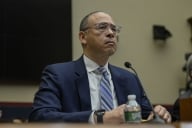You have /5 articles left.
Sign up for a free account or log in.
Faculty members have passed a no-confidence motion against the president and the provost. Students are protesting this week inside an administrative building. And faculty fears are rampant that entire departments might be shut.
The University of Northern Iowa is in turmoil, even as administrators prepare to meet this week with the Faculty Senate and the UNI-United Faculty, the faculty union, to discuss what faculty members are calling possible “massive academic program closures.” Union officials said they have been told that the university plans to stop awarding degrees in disciplines including religion, physics and philosophy and wants to eliminate about 30 faculty positions. Last week, the university announced that Malcolm Price Laboratory School, a K-12 school that gives UNI education students an immersive experience, would also close.
Officials did not discuss details Monday and said that plans were still evolving. Provost Gloria Gibson is expected to make a recommendation to President Benjamin Allen by the end of the week, but the plan for faculty reduction moved a step forward Monday when Iowa’s Board of Regents, a statewide panel, approved a buyout plan that would give tenured professors who leave UNI because of the pending changes a year’s salary and some additional benefits.
Some majors might be closed. There might be some restructuring,” said Virginia Arthur, the associate provost for faculty affairs at UNI. Arthur said the university was taking the measures to strengthen itself, and pointed to an increase in costs in the coming year, including a 3.5 percent proposed salary increase and increase in related benefits for faculty members and most UNI employees, that will cost the university $4 million. Northern Iowa currently has the full-time equivalent of 710 professors. “This is a difficult period but this is not an emergency. We will emerge from this stronger,” Arthur said.
(Note: This article was updated from an earlier version to clarify that the pay increase would extend to the university's staff.)
She pointed out that 92 percent of UNI’s students are from within the state, while institutions such as the University of Iowa and Iowa State University draw about half their students from elsewhere, giving those institutions more revenue from higher out-of-state tuition.
Faculty members at the university passed a vote of no confidence against Allen and Gibson at a specially called faculty meeting Friday. Officials said tensions between administrators and faculty have been brewing for the last two years, including an impasse over the demand for a 3.5 percent salary hike for faculty, which was ultimately resolved when an outside arbitrator sided with the union in 2011.
“There is a lot of top-down decision making at this university,” said Catherine DeSoto, president of UNI-United Faculty and a professor of psychology. “This is going to affect the academic integrity of the university.” Union members are meeting with administrators today to discuss how tenure rights and seniority might be preserved in case of layoffs, a possibility if not enough professors opt for the buyout.
"It is inconceivable that they would cut programs and take away opportunities from students,” said Howard Bunsis, chairman of the American Association of University Professors-Collective Bargaining Congress. The AAUP, which is affiliated with the UNI union, also sent a letter to university officials last week, protesting the lack of 'meaningful" faculty involvement in the forthcoming cuts.
News of the developments has shaken faculty members and students alike, with a group of students starting a “study-in” protest at an administration building Monday. Kelley Rouchka, a graduate student in history, said she helped organize the students because the proposed cuts and changes contradict the university’s mission. “We have been reaching out through e-mail and Facebook and our goal is to reach out to more students and hand them fliers, asking them to contact lawmakers and university officials,” said Rouchka. She said about 200 students had responded through Facebook and that the protests will continue through Friday.
John Deisz, an associate professor in the physics department, said he was stunned by the news that his department might be targeted for cuts. He said the physics department had hired a new faculty member just six months ago and secured about $160,000 in new equipment funding. “That is not consistent with the department being eliminated six months later,” he said.
It is not clear how students who are already in the physics program or any of the other disciplines that may be cut will be affected, though Arthur, the associate provost, mentioned that officials were working on a plan to let students complete their courses of study. “They have been claiming all students will be able to finish. We don’t know what the reality will be. We are not at a stage where we know,” Deisz said.
The American Physical Society, an organization representing physicists, sent a letter to UNI's president and provost last week, expressing its concern about the impending cuts.
The tensions at the university over the last month, Deisz said, are starting to affect prospective students who were planning to enroll at the university. Darian Everding, a senior at Waterloo West High School, in Iowa, said she was extremely concerned about the developments. “It is very unsettling that one of the programs that I am interested in could be eliminated,” said Everding, who wants to major in physics and mathematics. “I could consider going to another school but it would not be ideal. It would likely put me in debt,” she said.








